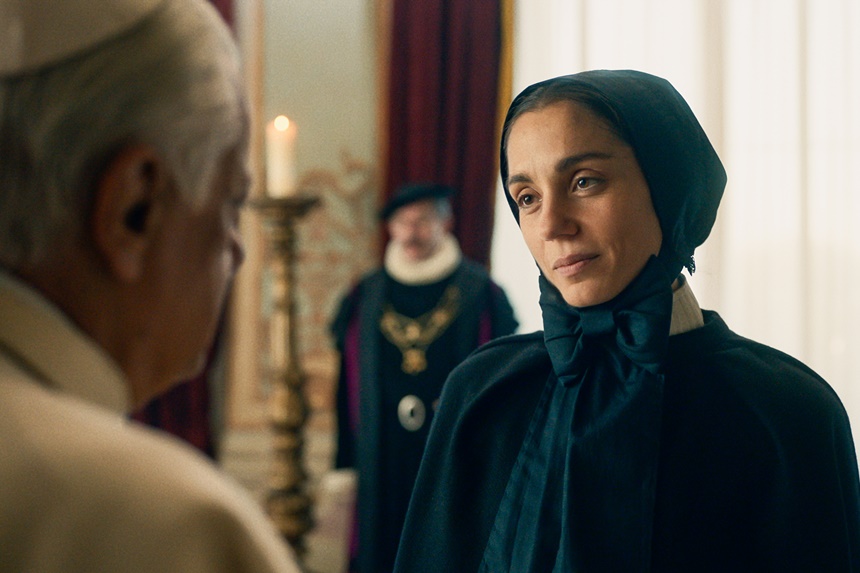Cabrini
⭐️ ⭐️ ⭐️
Rating: PG-13
Run Time: 2 hours 25 minutes
Stars: Christiana Dell’Anna, John Lithgow, Giancarlo Giannini, David Morse
Writers: Rod Barr, Alejandro Monteverde
Director: Alejandro Monteverde
Appropriately premiering on International Women’s Day, Cabrini gets admirably down and dirty as it commemorates an Italian nun who arrived in 1890s New York — defying the wills of both the archbishop and mayor — to administer health and hope to the city’s literally huddled masses.
Yes, Cabrini is one of those hagiographic biopics where the heroine’s chief “flaws” are her blinkered determination to do good, and her dogged refusal to compromise her clearly superior set of values. But director/cowriter Alejandro Monteverde (Sound of Freedom) wisely allows his willowy nun to be occasionally annoying in her self-absorbed stridency, and his harrowing vision of New York’s Gilded Age — a period when the earliest skyscrapers were being built on the blood and bones of a scandalously oppressed underclass — will have you looking for hollow-eyed ghosts the next time you ride Manhattan’s IRT subway.
Italian star Cristiana Dell’Anna plays Francesca Cabrini, known in Roman Catholic circles as the first U.S. citizen canonized to sainthood but to the rest of us chiefly as a name on numerous Catholic high schools and once-prominent hospitals in New York City and Chicago.
Our first glimpse of Cabrini is in a meeting with Pope Leo XIII (the great Giancarlo Giannini, rumbling and pleasingly grumpy), desperately trying to talk him into letting her start a mission in China. But the Pope has other ideas: He’d rather she head to New York City, where the abuse of Italian immigrants, virtually all of them Catholic, has reached brutal proportions.
Reluctantly, Cabrini gathers the half-dozen or so members of her religious order and sets sail for Manhattan which, for the unfortunate Italian community, has become a hellhole of crumbling tenements, mud-clogged streets, and rampant disease.
Iron-willed Cabrini immediately gets to work establishing a rudimentary hospital and a ramshackle shelter, but it doesn’t take long for her to determine the ongoing disaster in Manhattan is the result of systemic racism ranging from disinterested street cops to the mayor himself.
Even Archbishop Corrigan (pleasingly doughy Hurt Locker costar David Morse) is only tentatively in Cabrini’s corner, reluctant to take on the city’s Tammany Hall political machine. He’s willing to help out with material goods and facilities, but draws the line when the little nun starts preaching hellfire against the status quo.
At last, Cabrini sees no choice but to confront the mayor himself — and that’s a good thing on several levels, because Dell’Anna’s scenes with the inestimable John Lithgow, resplendent at his mayoral desk, the growing towers of New York framing him from behind, are by far the most riveting in the film. Lithgow’s mayor employs every power play in the book: looming over the diminutive nun, intoning imperious threats both veiled and explicit as he warns her to stay in her place as a) an Italian and b) a woman.
Of course, this is not a fair fight, as those of us who spent any childhood time sitting in the classroom of a Sister of You-Name-It well knows. Despite the bluster of the mayor, the archbishop, and the Holy Father himself, Cabrini perseveres — and ultimately triumphs.
That victory would register as a cheap movie construct if not for the solid performance of Dell’Anna who, as one of Italy’s most popular soap opera actors, has mastered that stare-you-down, what’s-she-gonna-do-next expression that can either bring viewers back from a commercial break or force fictional New York City mayors to their knees.
Monteverde builds his film on the foundation of those three excellent performances, but he’s strangely absent when it comes to just about everyone else on screen. Cabrini’s fellow nuns flit about her like sparrows, wordlessly going about their duties, nodding and retreating to the shadows when she gives them orders. I would be surprised if the whole flock of them have more than three lines in the whole film, implying that Cabrini was, herself, as dismissive of her underlings as the mayor is of the city’s Italians. Cabrini would have been well-served by one or two scenes in which the nuns revealed something of themselves other than their blind, mute subservience to the Mother Superior.
Almost as troubling is Monteverde’s choice to cast Lithgow as a fictional political figure, identified here as “Mayor Gould.” It’s a weird thing to do, especially since, at the time Cabrini arrived in the city in 1889, New York had a perfectly viable mayor in the person of the wonderfully named Hugh Grant (Come to think of it, as fine as Lithgow is in the role, wouldn’t it have been a hoot to have Hugh Grant play Hugh Grant?). It bothers me when biographical filmmakers arbitrarily alter easily accessed facts. I always end up wondering, “What else have they changed?”
Still, we can be thankful for the presence of Lithgow, who gets the movie’s best line: Clinking brandy glasses with the indomitable nun (a nice acknowledgement that Italians, even the sisterly kind, appreciate a fine aperitif), the mayor declares, “Cabrini, you would have made an excellent man.”
At that, Cabrini allows the faintest of smiles, as if to say, “But, why would I want to limit myself?”
Become a Saturday Evening Post member and enjoy unlimited access. Subscribe now



